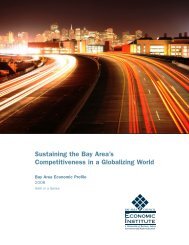Ties That Bind - Bay Area Council Economic Institute
Ties That Bind - Bay Area Council Economic Institute
Ties That Bind - Bay Area Council Economic Institute
You also want an ePaper? Increase the reach of your titles
YUMPU automatically turns print PDFs into web optimized ePapers that Google loves.
68<br />
<strong>Ties</strong> <strong>That</strong> <strong>Bind</strong><br />
judges through Berkeley’s Boalt Hall and the San Francisco-Shanghai Sister Committee, and he<br />
currently has an of counsel relationship with Chinese law firm AllBright Law Offices.<br />
Quan acknowledges that, while China has made considerable progress on legal reform in recent<br />
years, government enforcement mechanisms are weak and dispute resolution through the courts<br />
can be arbitrary. Even after contracts are signed, negotiations continue as to their meaning. Local<br />
officials, the central government and the Communist Party can all influence court and arbitration<br />
decisions and, at least until recently, they have tended to strongly favor the Chinese party in<br />
a dispute.<br />
The government tends to give “public good” considerations—protecting domestic industries and<br />
jobs, for example—priority over individual commercial rights. An extension of this principle can<br />
be said to apply to intellectual property cases, where China often sees a philosophical, developing<br />
country “right” to certain technology transfer free of prohibitive costs. Yet it should be stressed<br />
that China’s patent and trademark laws generally conform to those of most countries in the<br />
world other than the U.S., favoring the first party to file a patent or register a trademark versus<br />
the inventor or first user. And recently China upheld Pfizer’s patent on Viagra and toughened<br />
IP protection in cases affecting public health, in response to risks posed by counterfeit<br />
pharmaceuticals.<br />
Attorneys in China practice frequently refer to being “hometowned” by a legal system based on<br />
civil law tradition, with a three-judge panel instead of a jury, no attorney cross-examination of<br />
witnesses, and only a single appeal permitted. Most of China’s 200,000 judges are recruited from<br />
the military or the police and given on-the-job training, or increasingly are recent law school<br />
graduates with relatively little practical experience. Most judges are hired, paid, promoted and<br />
fired by local or provincial governments.<br />
Court “adjudication committees” made up of local administrative leaders may intervene in cases,<br />
usually behind closed doors. Use of local officials or police to harass outside parties to settle—<br />
either to dispose of a case quickly and quietly, or in a way favorably for local plaintiffs or defendants—is<br />
not uncommon. Behind the scenes influence from the Communist Party is also a frequent<br />
aspect of dispute resolution. Experienced attorneys, while praising China’s ongoing, rapid<br />
transition to the rule of law, privately acknowledge that use of connections and relationships—<br />
“guanxi”—is still an important asset that any foreign lawyer must bring to the table.<br />
Most commercial disputes are settled through an arbitration process rather than the court system.<br />
The favored arbitration venue specified in commercial contracts is the China International<br />
<strong>Economic</strong> and Trade Arbitration Commission (CIETAC), a panel of international lawyers established<br />
in China in 1989. Some 200 cities also have their own arbitration commissions as an alternative,<br />
and courts in some large cities have created special departments to deal with foreign trade<br />
and investment issues in lieu of arbitration.<br />
The system is still far from perfect: Even CIETAC has acquired a reputation for corruption, ex<br />
parte communications and other unethical practices. And some foreign companies receiving favorable<br />
decisions in arbitration have still had to sue in Chinese courts to enforce judgments








